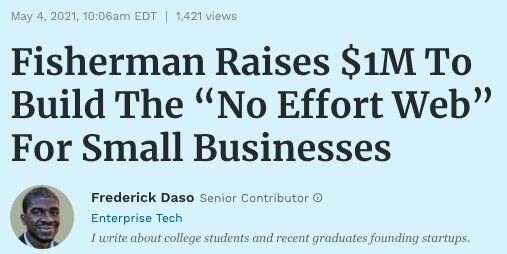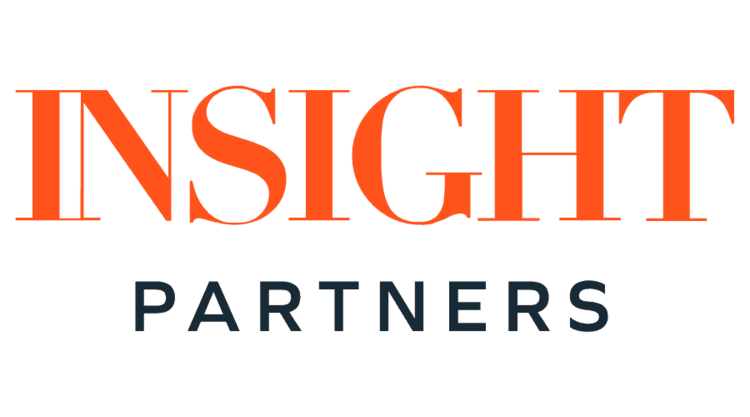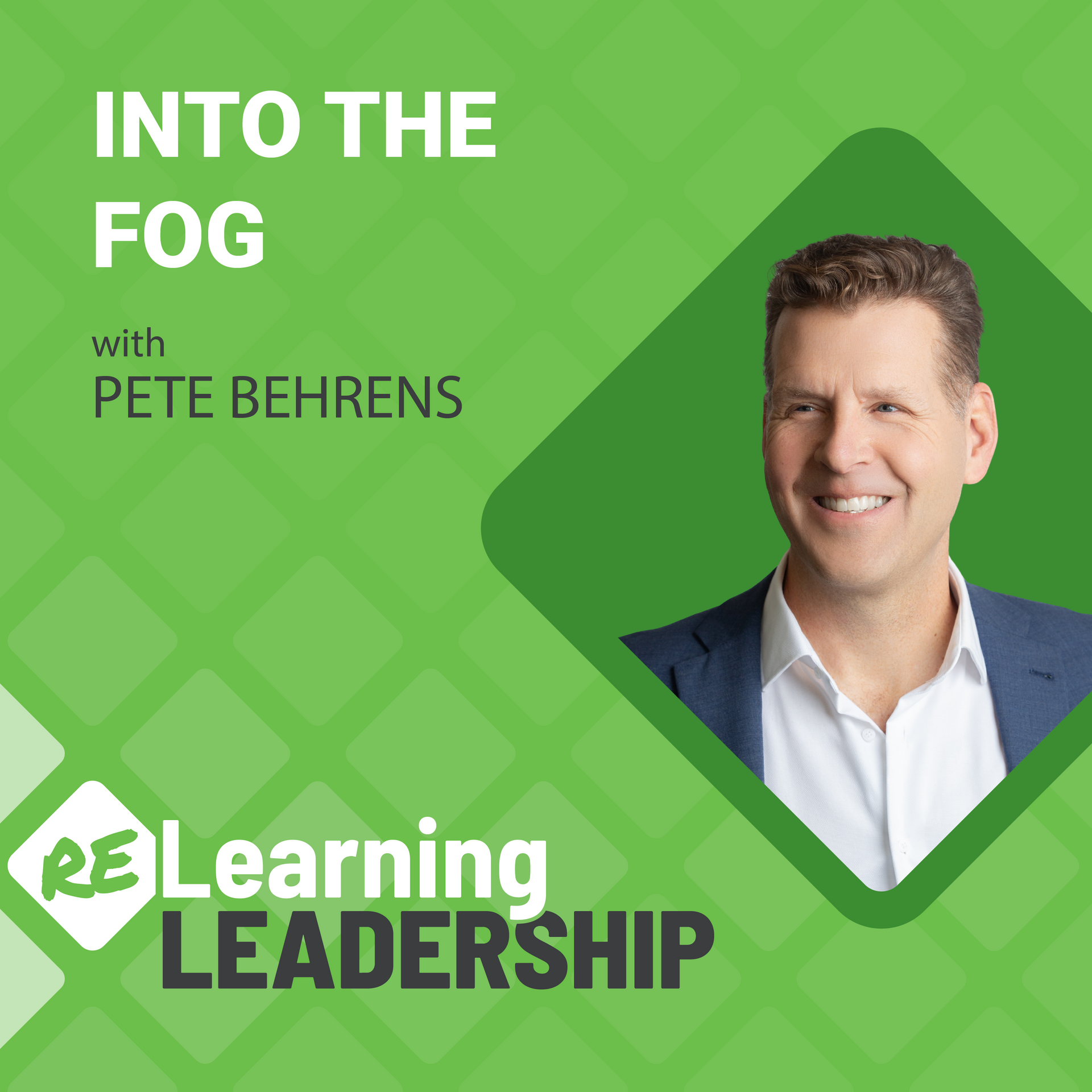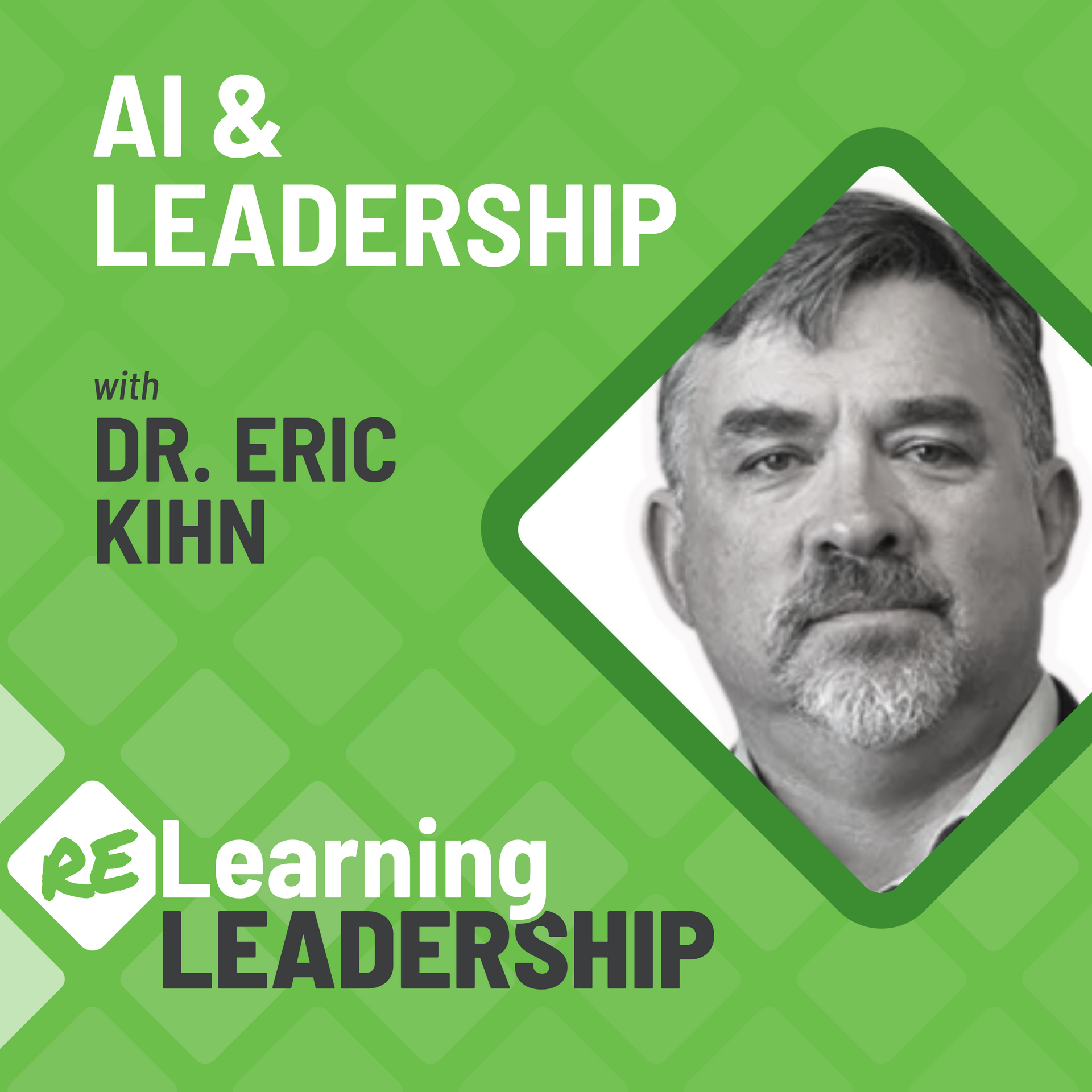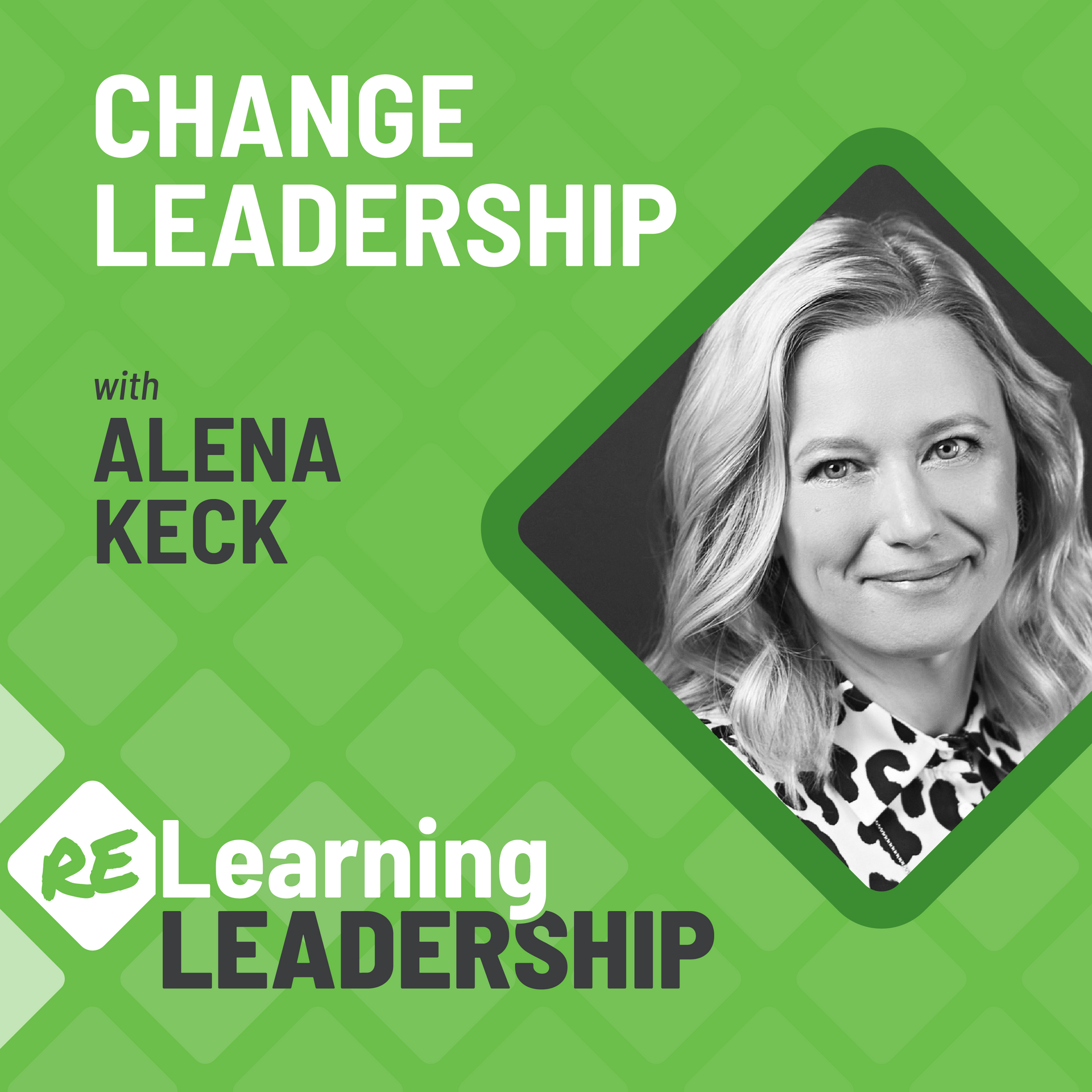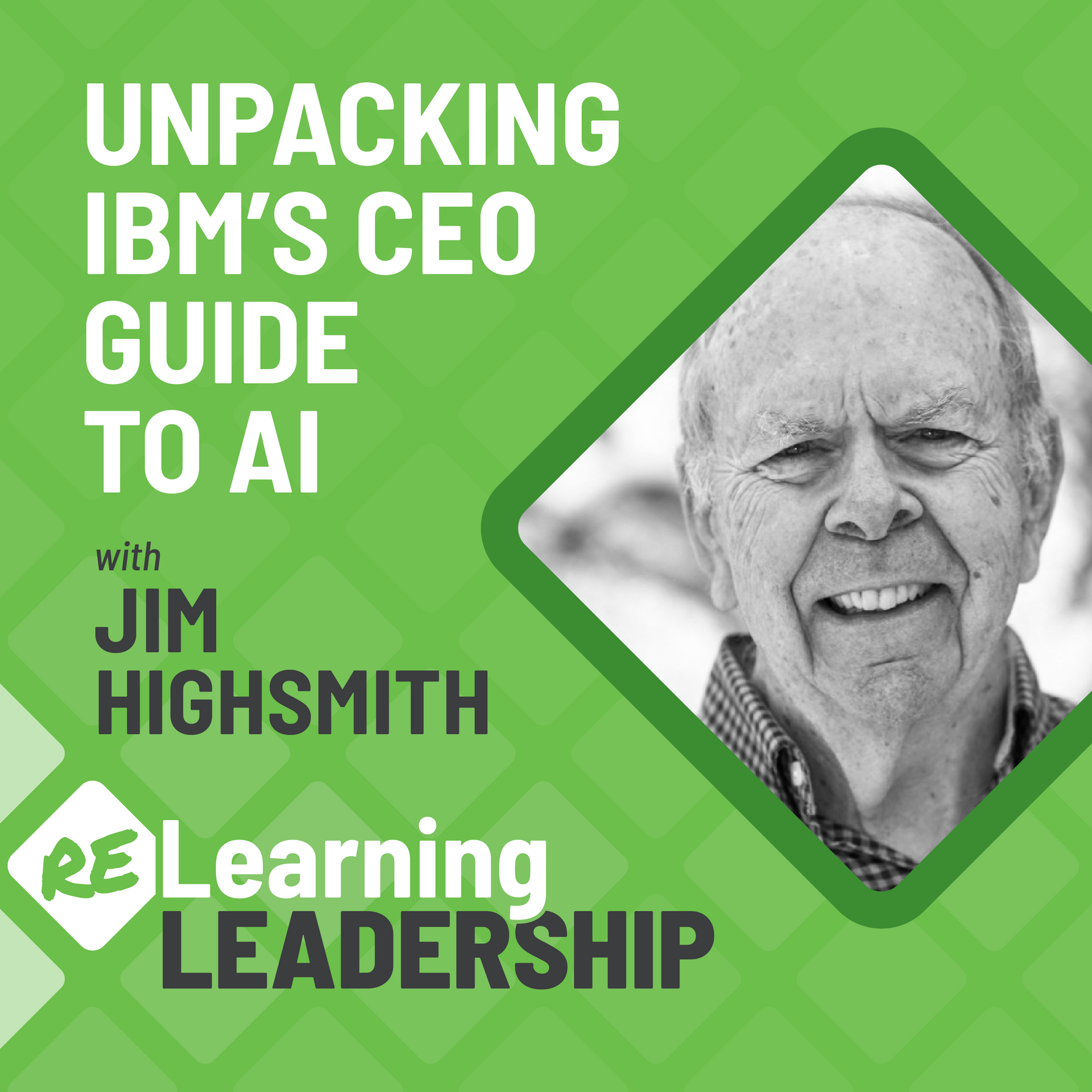9: Choosing Risk: A Startup CEO Perspective
What does it mean for a leader to "choose risk"?
Ameet Kallarackal, a first-time CEO and co-founder of Fisherman, a startup building a “No Effort Web”, shares his perception of risk/reward and his leadership journey of choosing to expand a new industry and build a new company.
Rachel Weston Rowell, a Senior Vice President with Insight Partners helping startup leaders scale-up their organizational discipline and culture, joins our discussion to explore the mindset and makeup of those charting new paths.
Ameet Kallarackal, CEO and co-founder
Ameet Kallarackal is the co-founder and CEO of Fisherman.
Fisherman automatically produces and manages complete websites for small businesses that lack the time, capital, and technical ability to do it themselves. Since launching their product in late 2019, the 10-person company has worked with over 1,000 small businesses in all 50 states.
In 2020, Ameet was recognized as The Raffoni Group CEO Under 30.
Previously, Ameet was a founding member of Campus Insights, which provided millennial-focused user research to tech companies like Venmo, GoFundMe, and AirBnB, before being acquired by Harvard Student Agencies. He worked on the Product team at Blue Apron and was a Gabelli Presidential Scholar and Coca-Cola Scholar at Boston College.
Outside of entrepreneurial ventures, he enjoys playing violin and soccer, writing short story fiction, and reading philosophy.
Connect with Ameet
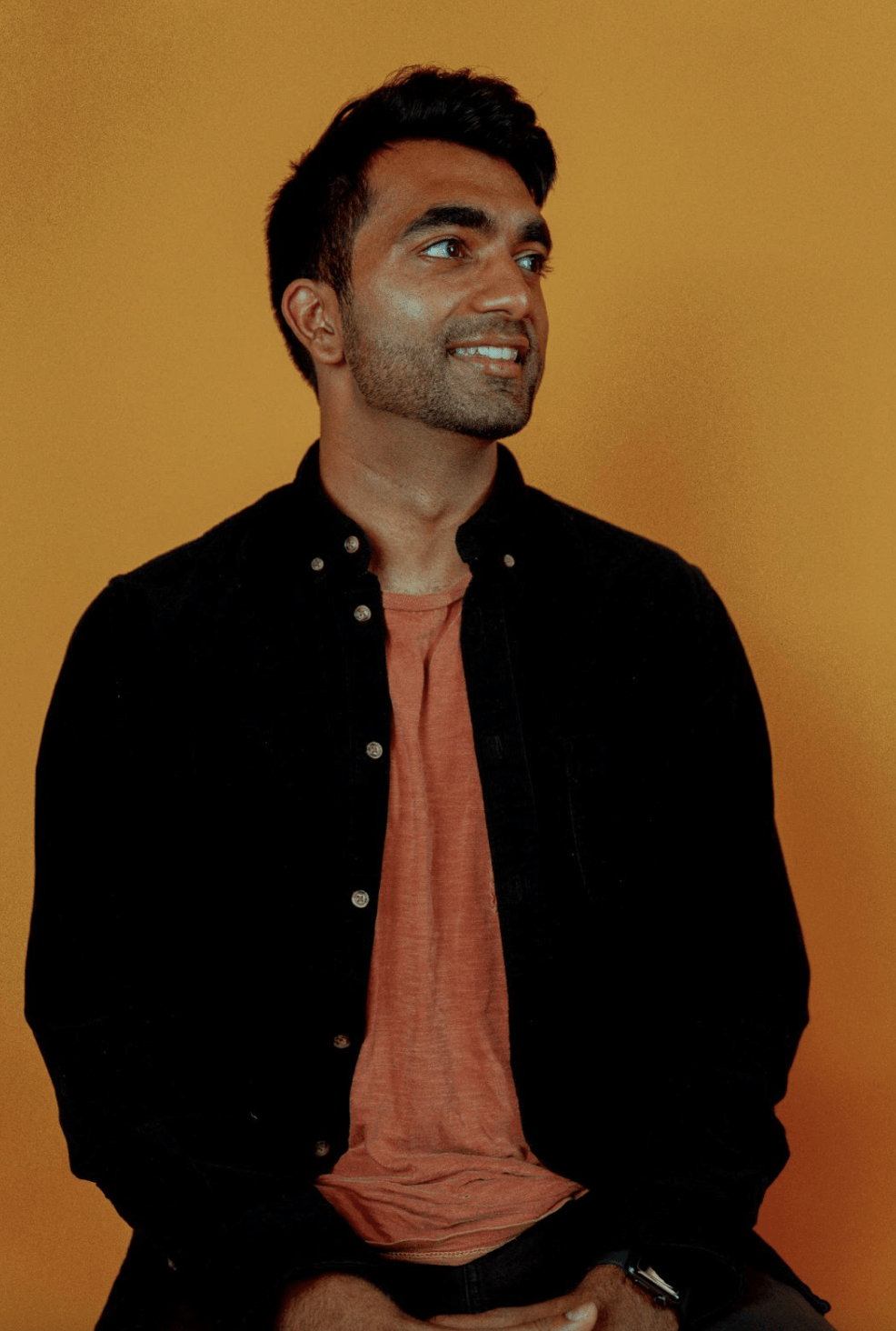
Rachel Weston Rowell, Senior Vice President
Rachel Weston Rowell is a Senior Vice President in the Onsite Product & Technology COE at Insight Partners. Rachel collaborates with Insight’s portfolio company executives to enhance their organizational discipline so they can successfully scale while staying aligned to the startup culture they have cultivated and love.
Her passion lies in helping organizations transform so that they can not only survive, but so that they can shine in their market. She is also an expert facilitator and loves creating spaces where people can work together and drive to action. She believes that meetings do not have to suck.
She lives and plays in Denver, Colorado with her husband and daughter.
Connect with Rachel
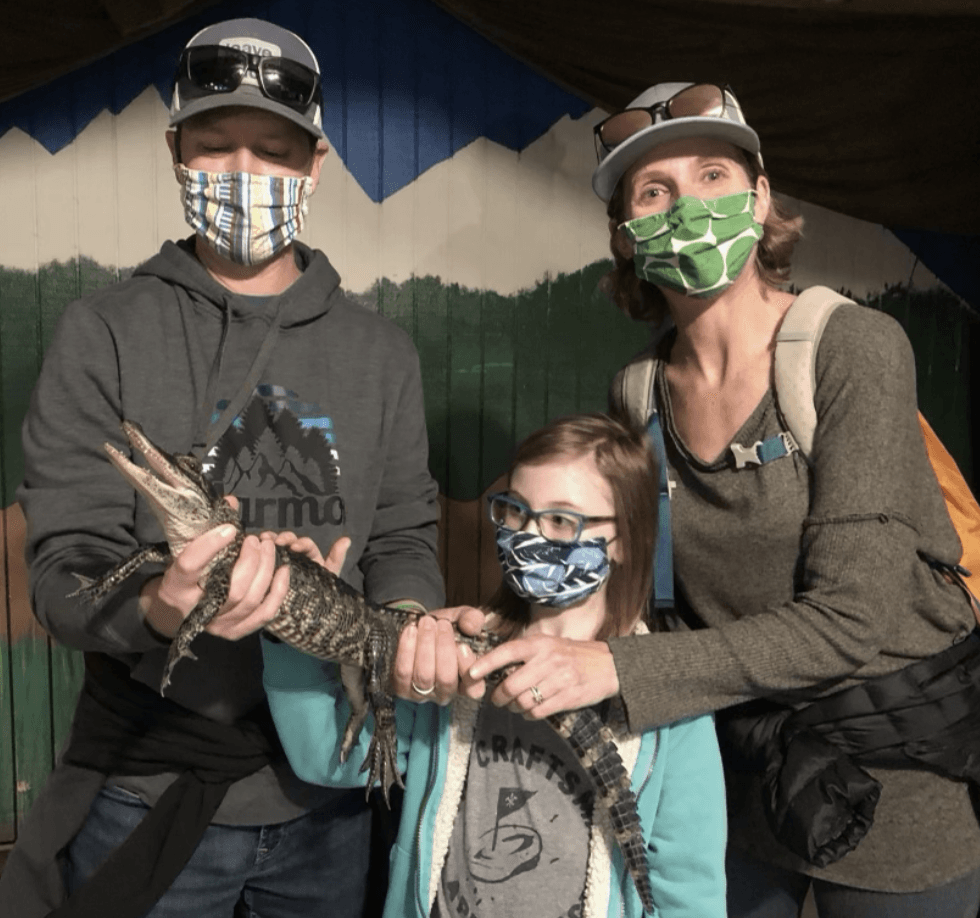
Learn more about Fisherman
Fisherman technology has built hundreds of restaurant websites, and we’re just getting started.
There are millions of small businesses that don't have a website or have a critically outdated website, and it's usually because the manager doesn’t have the time or budget to focus on getting one. Consumers are increasingly relying on the internet to make buying decisions, and larger brands are pouring money into improved websites and apps. Digitally integrated businesses keep winning, and smaller businesses are often taking the hit.
Growing up with parents as small business owners, we’ve experienced these problems firsthand. We started Fisherman to level the playing field, starting with restaurants. We've spent the last year at GSVlabs Boston building technology that can automatically design and build websites for small businesses. Just provide your business name and address, and we will take care of the rest.
Learn more about Insight Partners
ScaleUps are on the most difficult part of their journey: turning initial viability into exponential growth and long-term success. A decision can mean flight or free fall. That’s where a trusted partner comes in. For 25 years we’ve partnered with the world’s leading software ScaleUps, providing the capital, operating guidance, and expansive network companies need to propel growth for the long term – and soar.
Relearning from Ameet's founder story…
It inspires and humbles me to see young entrepreneurs thrive in our new digital economy. Ameet demonstrates maturity, intent and priorities of leaders with much more credentials.
- Risk is a perception - Ameet chose to equate his job risk with learning and growth opportunity. Does that make a startup environment more (or less) risky? Choosing risks, like with a startup, provide many more “heat moments” for growth. Listen to our Future Leader Episode for more on heat moments.
- Keep a loose grip - As I have learned in my golf swing, if my strong aim leads to a strong grip, my shot will likely falter. Having strong convictions and vision are a great asset, until your environment changes around you. Your ability to pivot based on real empirical data is just as important as beating the drum of direction.
- Phone some friends - While seemingly lonely at the top, Ameet has surrounded himself with a strong co-founder, and a diverse team of mentors, advisors and investors to increase his pace of learning and improve his company’s success profile.
As was mentioned in the episode, I am an advisor for Ameet and an investor in Fisherman. I choose to invest in people over products. And as someone twice his age, I find his focus, priorities, and willingness to reach out for help to be strong signals of a great investment.
Episode Transcript
Pete Behrens:
What is it like to look at the global corporate landscape and say “No! I’m choosing to create a new company”?
Welcome to another episode of Relearning Leadership, where we explore a specific leadership challenge and break it down to help improve your leadership, your organization… and even your personal life.
Today we follow the story of Ameet Kallarackal, a first-time co-founder and CEO of Fisherman, a startup building a “No Effort Web” for small businesses. Three years in, Ameet is navigating the risks and rewards of venturing on this new, risky path.
Ameet Kallarackal:
Yeah, jumping from college to a CEO role was a little bit daunting. I, at that time, had no experience with startups. Fast forward three years: a lot has happened in the bootstrapping and fundraising along the way to get here.
Pete Behrens:
Midway through our conversation, we’re joined by Rachel Weston Rowell, a Senior Vice President with Insight Partners helping startup leaders scale-up their organizational discipline and culture.
Rachel Weston Rowell:
There're so many moments where you're out over the edge of your skis, as we like to say in Colorado. And you're doing something you haven't done before, and yet you have to show the rest of the organization that it's okay, that we're safe, that all of this is going to work out.
Pete Behrens:
Thank you for joining us today, let’s dive in!
I'd like to introduce Ameet, who is a co-founder and first-time CEO of Fisherman. Welcome to the show, Ameet!
Ameet Kallarackal:
Thank you for having me, Pete.
Pete Behrens:
Well, as what I would call the first salesman and fundraiser for your company, I can imagine you have a great elevator pitch. Do you mind sharing that with us?
Ameet Kallarackal:
I'd be happy to, yeah. Essentially the problem is there are over 20 million small businesses in the U.S. alone, and about 30 percent of those small businesses don't even have a website, let alone really good and rich digital marketing to help their businesses succeed online. So for us at Fisherman, we're trying to help those businesses out.
And there's a lot of different solutions out there for websites and for digital marketing, but a lot of those are either expensive, where you have to hire an agency to spend a lot of time working with you hands-on to put something together, or they're very do-it-yourself and self-service, where you need to build and manage and design everything yourself. And for a lot of these small business owners, they lack the technical savviness to do it themselves, they lack the budget to go hire an agency. So they're left with nothing. And what we're trying to do at Fisherman is solve for that gap and build software that can handle all of that creation, the design, the development, the management of the digital marketing world for these businesses, fully automatically. And we're starting with websites and SEO for restaurants.
Pete Behrens:
That's excellent. And having been personally through probably five or six website builds myself, I know that can get quite expensive. The reason I like your story is—and I hesitate to call you young, because I think that makes me feel old, and I don't want to feel that way [laughs], but you are just a few years out of college, is that correct?
Ameet Kallarackal:
Yeah, that's right. About three years out of college.
Pete Behrens:
I'm curious about your journey out of leaving school and getting into the CEO role. That was pretty quick for you.
Ameet Kallarackal:
Definitely. It's always exciting to talk about our story, since it does feel on one hand that we're early in our story, but on the other, we've put so much time into this that sometimes it's weird to look back three years ago and think, “We were just in school!” But my co-founder and I, we met in school as seniors in college. The first conversation we had was me pitching Fisherman to him, to Nick. And he had a full-time job offer at the time, to be a software engineer. And I was sure I wanted to work full-time on a startup.
Fortunately towards the end of college we got into an accelerator program called Mass Challenge, in Boston, and that was the first indicator to us from the outside world that maybe we had something that was worth pursuing full-time. And we both decided at that time, “Alright, we're going to do this, we're going to go full time. He reneged his job offer, we ended up moving into his parents house in the suburbs of Boston, lived there for a full year. They were gracious enough to let us live rent free there for a while. And the whole time we were building the product, we were talking to early users, we were building relationships, building our network.
But, yeah, jumping from college to a CEO role was a little bit daunting, but fortunately for me, I had worked in a startup prior to that, and so had Nick. Nick had worked in a couple startups during college doing development, and I had been on the founding team of a startup during college. And I, at that time, had no experience with startups, but the co-founders had a lot of experience there. They came from Silicon Valley, and I learned a lot as we, together, built this organization to exit. And that gave me the confidence to try to pursue something like this.
So it just felt like the right move to work full-time on something ourselves. And fast forward three years: a lot has happened in the bootstrapping and fundraising along the way to get here. But very, very grateful for that decision.
Pete Behrens:
You're following in a lot of garage footsteps of HP and Apple and Facebook. Talk a little bit about the feelings side of this, as far as that jump and the risk of not having a salary. Did that feel risky at all to you? Or was this, “I'm used to living on this college salary of no salary”?
Ameet Kallarackal:
Yeah I think, a couple things here. Early on, when I was in high school even, I saw financial independence as being a really important quality. I wanted to be financially independent as early as I could, so that I could make decisions fully on my own. From high school I started working jobs, just making a little bit of money here and there. But even just for college, a lot of my decision-making about where I would go was around what type of school could I go to that allows me to graduate with the least amount of student debt. So I was able to graduate without any student loans, and I think that's a huge advantage because otherwise I would have absolutely felt more financial pressure to get a job that could help to pay off those debts.
And then, lastly, Nick and I knew that no matter what the value of the growth that would come from trying to build something from scratch, it would make us better candidates overall for the same types of jobs that we would have been applying to during school. It felt like we'd only be stronger as we built our network more, we built skills more, and understood what was possible more.
Pete Behrens:
I think you're right. I know when I look back at my career, I find those risky jumps to be the most growth-oriented. They're the ones where you have to show up, that force you to sink or swim. And I can imagine it's escalated your growth as an early entrepreneur.
Ameet Kallarackal:
Yeah, I completely agree. I think the mindset has to be, “It doesn't even feel like a risk, because in the worst case scenario the things that you're gaining make it worthwhile.” And if you're seeking financial gain alone, it could definitely be seen as risky. And I absolutely understand the situation that a lot of people are in. It doesn't really make sense to take that type of risk, but as relatively young people, where we know we can go develop a career outside if we needed to at the time, it felt worthwhile, since for us the risk profile was more around learning and skills and network building.
To be honest, personally it didn't feel like I was taking a huge risk at any point. It was scary, because there was so much we didn't know about and didn't know was going to happen, but it was really exciting.
Pete Behrens:
Well, it's interesting you got through school without loans, because I know you haven't gotten through this corporate thing without some financing. Talk to us a little bit about that journey in terms of that risk profile, and how much you really want to go into debt as a company.
Ameet Kallarackal:
I think there are absolutely Silicon Valley companies that are a lot more risk-tolerant when it comes to fundraising than we are. But on the other hand, we have raised capital, we haven't been fully bootstrapped. And it's a constant question of, “Alright, what's the right balance here for the growth of this business as well as for leverage that you have in the business?” We wanted to wait as long as we could to raise money until we felt confident ourselves that this is something that is valuable to the market.
So the first year, we didn't even consider raising capital, we were just very focused on building. We also started a web design and development agency to help us bootstrap as long as we could. And finally, it came time where we had a product that was working, we had our first few customers that were happy, and we had our first opportunity to market in a bigger way. So we were able to raise a little bit of capital and use that to start to pay ourselves for the first time, to shut down our custom development agency, to move into Boston, and really just take on higher stakes.
We still haven't raised a traditional institutional venture capital round, mostly because it's a different level at that point, where you bring on another board member, or board members, and the direction of the company's turned a little bit. And you also have a responsibility to grow along certain metrics and to burn more capital and hit certain numbers. For us, we felt like there's still a lot of different ways we could fund our growth, and we wanted to control as much as possible, until a point where it's very clear that x amount of capital in leads to y capital out. And when we know that, then it can make sense to bring someone on who's done that type of scaling before and to bring a lot of money on to just grow faster.
But traction speaks volumes, and I think going as far as you can to get traction without outside capital, the better. We've been really fortunate to have investors until today that trust us as co-founders to lead the direction of the company and are really supportive in a lot of other ways, too. So it's been a nice balance.
Pete Behrens:
What I'm hearing is a tremendous amount of maturity in your decision-making. Not wanting to give up too much control, recognizing growth just for growth's sake can be dangerous. What have you run into that you just did not anticipate as you entered into this?
Ameet Kallarackal:
Most things, I think, were a little bit surprising to me, since it's all pretty new. We've had to learn everything from scratch, everything from the hiring process, the sourcing, the interviewing, the onboarding, the vetting, the due diligence,
the management afterwards. One thing that's been surprising is how consistently there's a process that can be applied to these functions. I really thought all of these functions would be super distinct, but there's kind of a consistent process I go through whenever there's a new thing to work on.
First there's research, talking to a lot of people, getting a lot of advice, specifically talking to people who have done it before. And then building a spreadsheet of targets to go after and running a process, really.
Another thing that's been surprising is just how accessible a lot of people really are. I think I sort of imagine that as an early-stage startup founder, trying to get in touch with people who are running much larger operations or execs at much larger corporations would be really difficult to get in touch with. But I found it to be kind of the opposite. A lot of people are really willing to give their time, especially when it's an early-stage startup, to offer advice, to offer guidance, and potentially collaborate because they see it as a source of innovation. And so I found that cold-targeted email outreach and Linked-In outreach has been a lot more effective than I expected. It's been very cool to see, and hopefully I can pay it forward, too.
Pete Behrens:
I think that's nice to hear that our community is as collaborative as they are competitive. What would you say has maybe been the most challenging as a first-time CEO?
Ameet Kallarackal:
Yeah, I think the single most challenging thing that I constantly have to be reminded of—I even leave a note to myself every month—is spending time between working on the business versus working in the business. And I think, especially not having a ton of strategy and leadership experience, there's a default setting to go and do things yourself, especially as an entrepreneur, where early on it was just Nick and me doing everything ourselves. There is a tendency to just go right into the weeds, to do all the research, to have all the conversations, to build all the spec’ing docs and implementation, everything from scratch. And when you have a team available, and you have capital, and you really need to grow, trying to pull back, figure out how to delegate effectively and think more strategically long-term, is critical.
And it's always evolving. Every day, we're a slightly different business, and every month, things look very different, and every six months, almost unrecognizable. It's extremely important to be mindful of what's the right balance, because that balance changes.
Pete Behrens:
You described that really well. You've been learning really well, because I would say there's many leaders twice your age who still struggle with letting go, who still struggle with separating the work “IN the Business”, the projects and the technology from “ON the Business”. What's the culture? Is the team needed to deliver this product we're building? That's a hard switch for leaders at every level in an organization.
Ameet Kallarackal:
Yeah. I was having this reflection a couple days ago. I keep a to-do list. I need to keep a really clear documented list of things that have to get done. But over time, keeping that list and referencing that list, I can almost sense my brain thinking, “Okay, to-do list mentality! Gotta check the boxes, gotta finish these tasks,” when it really shouldn't be thinking of it that way, it should be thinking, “What's actually meaningful? Why are these tasks on this list?” So I've started meta-ironically adding in a task to ask myself why those things are on that list to begin with.
Pete Behrens:
Yeah, and whether you should be doing them.
Ameet Kallarackal:
Whether you should be doing them, exactly.
Pete Behrens:
Yeah, so
with regard to
the success side here, what do you claim to be critical to that early success and that early growth you've had so far?
Ameet Kallarackal:
I think a couple things stand out—and we have been working hard for three years and building a robust product and working closely with users the whole time. But it's still a long way from finding what I would consider to be meaningful success. I think a couple things in particular help. One is mentors, surrounding yourself with people who have done it before, both in a macro-sense of building businesses before, but also specifically the type of industry that you're in and understand the types of customers you work with. People who you can bounce around ideas with and avoid blind spots and potential pitfalls down the road.
The other thing is just a really relentless focus on unit economics. Find that magic equation of, “Alright, we take this amount of capital in; we can produce this amount of revenue.” Just really staying focused on unit economics has made us stand out among other companies at our stage. And I think investors that we've talked to, and other people in this space, have really liked that, since that's how they think about it, too.
Pete Behrens:
Yeah, having
watched enough
Shark Tank,
I think you’d do quite well pitching to some of that crew.
“Show me the numbers!” [Laughs]
So if somebody else is thinking about
this journey, whether they're fresh out of school or coming in with some experience—any thoughts you have on
what you might recommend to them?
Ameet Kallarackal:
Yeah. I, not that long ago, was reading this post by David Cummings around the comparable time it takes to build a 5 million dollar business versus a 50 million dollar business versus a 500 million dollar business from an individual founder’s time perspective. And I thought that was really compelling, since depending on your ambitions, your goals, you know you're going to be spending a lot of time. But humans have limited time, and you can use that time to build something that is small, or you could build something big, or even bigger. And I think it's just worth thinking about, because I think most founders, myself included, want to build something really, really big. And I think it's important that early on you do the research, do the soul searching, do the reflection to see, is what you're working on, what you're planning to dedicate however many years of your life to, is it worth it? Is it big enough to be worth occupying that much of your attention?
And then the second thing is, I really think the founder journey that I've been on—I have zero regrets, and I've honestly enjoyed it. I haven't been super stressed out at any point, because consistently I've really felt like I'm growing more than I'm losing. And going back to what we were talking about earlier, if you care about growth that's bigger than the job description, and outcomes that are bigger than the road map, then it's really a can't-lose situation. If that feels like the type of person you are, then you're probably just limiting yourself by not doing it.
Pete Behrens:
Yeah, it reminds me of
our last episode with Dean Leffingwell: if you find your passion, you won't have to work a day in your life, or it doesn't feel like work.
Ameet Kallarackal:
Yeah, yeah.
Pete Behrens:
I can imagine, for somebody on the creative spectrum, that this is quite exciting. For somebody who likes a little more stability, probably a little scary.
Ameet Kallarackal:
Yeah, definitely. I happen to be obsessed with change, so I think that works out. [laughs]
Pete Behrens:
I now want to expand our discussion and bring in Rachel Weston Rowell, a Senior Vice President at Insight Partners, a New York-based venture capital firm helping startups to scale up. Rachel assists their portfolio company leaders to enhance organizational discipline and culture. Welcome to the show, Rachel!
Rachel Weston Rowell:
Thanks, Pete.
Pete Behrens:
Well, it's exciting to have you join Ameet and I in this dialogue, and I know you’ve been listening in. And I'd love to hear your thoughts
on Ameet’s story. What jumps out to you?
Rachel Weston Rowell:
One of the things that I find fascinating about startups and I definitely heard in your conversation with Ameet, is the speed at which learning happens in the startup environment. We're always learning in companies, but I feel like
it's that hyperdrive speed when you're in the startup. And so, I was curious a little bit about what that experience has been like for Ameet, and how you balance taking in all this new information, and how that directs you on your path, while at the same time paying attention to who you really want to be in the market
and for your customers.
Ameet Kallarackal:
Yeah, that's a great question. One piece of advice I got early on was, “There's always going to feel like a hundred things going on at the same time, and it's important to recognize the one or two levers in the current moment that are most important to focus on.” That's been my approach, to try to narrow in on what is the one thing I should really try to focus on right now.
But the other side of your question, which I thought was interesting, was focusing on what are our unique values as a company. And when I think about Fishermen, I think we're really product-heavy, and we've got a lot of great technical expertise. And I think it is important to—no matter which lever we’re focused on—to not lose sight of that. So, yeah I do think it's a constant learning curve, and it always feels like there's not enough time to learn what's necessary, but focusing and narrowing in on one or two things has been helpful.
Rachel Weston Rowell:
Yeah, as I’ve worked with startup leaders, one thing I've seen happen sometimes is, you have a really good idea, right? That's why you're doing this. “I have an idea that I can help people with. Maybe I even have technology or tools that I'm really proud of, and we're really excited about, and we can help people with.”
But there can be moments when you go and you actually talk to the market, and you realize that there's some aspect of the thing that you created that you're proud of that doesn't really satisfy what they need. And that can actually almost feel like a knock to your pride or your belief in what you're doing. And I wonder, have you had that happen yet, where you’ve maybe had to take something that you thought you were right about and take a turn and say, “I think we were wrong?” How do you work through that as a leader?
Ameet Kallarackal:
Yeah. That happens all the time. It actually just happened. I just realized one of these situations yesterday. And it especially happens a lot to us because we're trying to innovate in a category and build certain technologies that haven’t existed before. And there's always that balance of having to build something in order to see if it works, but also collecting feedback to know what to build. So it's this weird chicken-and-egg problem that can be challenging to get the right balance to strike.
We, in fact, budget on our product roadmap—upwards of 50 percent of our time in the quarter, during the month, we're going to have to change direction. Because all it takes, especially at that early stage—one big opportunity can be enough of an influencing factor to completely shift our priorities.
And there's also situations where we’ve realized, “Oh, wow, This thing that we didn't think was going to be valuable is actually very valuable!” That's what happened to us; that's what I realized yesterday. A certain product that we decided not to build because we thought there were enough competitors that were offering a solution here already. But it turns out that those competitors were missing something really specific that made all the difference. So it's important to be comfortable with being wrong and changing gears as needed, but also staying true to your core direction of where you're heading and not give up 100% of your time to new things.
Pete Behrens:
So, Rachel, let me turn this question on you.
Do you see something in leaders that might help them recognize this? Because I can imagine this sense of pride and the sense of right-ness is in a lot of these founders.
Rachel Weston Rowell:
Yeah. There’s this mantra I often have, both for myself and with other leaders, which is “strong beliefs loosely held.” So, as a leader, you have to be clear and consistent in your vision to help people stay aligned and motivated. It's so important to set that path and keep people on it. You keep beating that drum, like “Here's where we're going!” But then you also have to be able to say, “We were wrong,” or “I was wrong, and now we need to go this direction instead.” And I think in the pace of startups, that happens really rapidly. And so I feel like you build up this great muscle memory about how to do that, and people get more comfortable with it. But I think as companies scale, it hardens a little bit for some leaders, and they get stuck with, “No! We’re right, we’re right, we’re right.” And it becomes harder for them to do the
quick pivoting and shifting that startups do.
You see companies saying, “We need to be more innovative!” And I think at the core of that is this self-recognition—hopefully self recognition—of, “I, as a leader, need to be more willing to let go of my strong beliefs to make them more loosely held,” and be more willing to say, “Maybe we got this wrong, or maybe the market changed,” or “Maybe that competitor was right,” or “Maybe our data was not as good as we thought it was, and now we need to shift direction a little bit.” But it is always that balance between, you don't want your company to feel like you’re wishy-washy. You don't want to feel like people start doubting that the leadership knows what they're doing. So it's a balance, and it’s a dance you have to do.
Pete Behrens:
Yeah, I love your one-liners, Rachel. You come up with them all the time. “Strong beliefs loosely held.” [Laughs] We’ll remember that one! One of the things that we saw is Ameet’s ability to pivot and change. How do we find the right balance between that vision that we might create, and change. Does that show up in some other ways?
Rachel Weston Rowell:
Yeah,
it has me thinking about the importance of being outcome-focused versus output-focused. Ameet, you brought this up, actually, when you were talking and thinking about why are things on your list. And not just having the list that you execute against, but being really thoughtful about why they're there in the first place, which to me is really an outcome mindset versus an output mindset. And I think it's easy to fall into that behavior of output. “Which features are we delivering? Which customers are we selling?” The timeline and the things that we're trying to push out of the organization, it can lock us into a path that doesn't respond to the new information that we have.
Versus if we stay focused on outcomes, the output can shift and change, and our feature sets can change, and our approaches can change, but the goals that we have, the intention that we have, the why that we bring to the space, can stay more solid. And so I think it gives us more flexibility. This is one of the things I think Agile mindset really got right. Which is, “Let's let the scope flex!” As long as we know where we're trying to go and the outcomes were trying to deliver, we have so much more flexibility in how we achieve those goals.
Ameet Kallarackal:
Yeah, I absolutely agree. That’s really insightful. I think about our own roadmap, and even in my own personal life, how I think about my own goals. I'll start as high-level, as long-term, as possible. And a lot of times, those are just trajectories.
And I definitely find that the more steps towards the present day that I get, the more flexibility I need to factor in the individual things you come up with to try to achieve those outcomes, those are the things that flex a lot more.
Pete Behrens:
You bring up a visual for me, and that is—we often say you know we have clarity in vision, but agility in execution. And that signals this long-term focus on something, but that near-term pivot you need, because you run into things along the way.
So Rachel, what are the specific types of Ameets you're looking for? What are some of those characteristics you look for in the CEOs that are coming to you?
Rachel Weston Rowell:
Part of it depends on where the company is in its growth cycle, but also focused on scaling business, because that's historically where I've spent a lot of my time. Often what I'm looking for and what I'm hoping to help with is, how do you design an organization that can scale rapidly? Because typically, if you get a big infusion of investment, it's so that you can grow faster.
That's often what's happening, especially at the post-startup phase. You found product-market fit, you found that sweet spot between
your addressable market and what you have to bring.
And the investment is a way to get access to more of the market more quickly. Whether that's through building new aspects of your product or increasing your go-to-market motion, whatever it is. And that's going to mean building up the company, hiring more people, expanding the number of products you have, whatever that looks like. And so, we're looking at, from a leadership standpoint, do the leaders have what they need? Both in terms of organizational structures, tools, but also in terms of their skills and their capacity to scale that organization that quickly. I regularly have seen companies in my career who are going to hire as many people in a year as they currently have on staff. So there's 75 people today, and there's going to be 150 by the end of the year. That's not an easy thing to do.
Because it's not just the hiring, right? Which, in and of itself, is a huge amount of effort that you have to go through of recruiting and interviewing and onboarding and all of that. But it's, “Where do those people go? Which teams are they on? Do we have to redesign teams? Who do they report you to? Is there enough leadership to support them? Do the tools we have support them?” There’re all these questions. So scaling and the capacity to do that, and having what you need on hand to be successful with that—that's a very important element that I'm often looking at. And making sure that those folks feel supported and able to do it, because you don't want investment to blow your company up. [Laughs] That would be the opposite of what we're trying to achieve.
Pete Behrens:
Ameet, on the receiving end, do you also look at partners who
bring in a little bit more? “It's not just about the money”? Or is it a little bit more of the Tom Cruise, “Show me the money!”
I’m curious about your perspective on how discerning are you on the receiving end.
Ameet Kallarackal:
Yeah, it's an interesting question. I do think about this a lot, and I do think my thoughts evolve on this, in part due to the shifting power dynamics. I think a lot of it does come down to the power dynamic between
an investor and a start-up, or a founder. And those aren't the same in every situation at all. Really good startups can pick and choose which investors come onto their team. But companies that really need to raise money and are a little bit more desperate to raise funding and maybe have less of a network, there’s less power there
to pick and choose where that money is coming from. So, in my own case, as much as possible, I'd like to be in a position of being able to pick and choose.
And to the extent that I can, absolutely. You can raise money from a couple different sources, then it does come more down to, “Well, what in addition to the money, is being included here? What are the types of expertise they bring, or the network they bring?” I do think about stuff like the diversity of our team going forward because that's a weakness. And so much of that is also based on “Well, how big is your own network? And what are the resources like to be able to grow outside of the way that you are?” So there’s a constantly shifting power dynamic.
Pete Behrens:
When we talked, Ameet, I know early on, you were much more interested in me as a person than my money. That's something I really appreciated. “What can you bring to our business?” And you said that to me. “What can you bring to our business that's meaningful, that the investment then helps fuel?” And so I really loved how you’ve been quite selective, at least in the early angel funding stages, of the people you've brought on board.
Ameet Kallarackal:
Yeah, we have a spreadsheet of all the people in our cap table, and
a list of the things that they bring to the table. And we try to make sure that everyone brings slightly different things to the table. And there're always things in that spreadsheet outside of just capital. So again, I think we're fortunate to be in a position where we can do that,
but considering that we are in that position, it's absolutely something that's top-of-mind for me. Because we want to build relationships, and you're dedicating so much of your life and so much of your time to a venture and investors, advisors, mentors, employees, customers. These are all people you're spending a lot of time with, and ideally you’re building relationships along the way, too, that last even beyond the venture.
Rachel Weson Rowell:
Ameet, you talked about paying it forward and all the mentors that you have, and how you want to take that and bring that forward. And I think that's a great example of the positives that can come from that.
Ameet Kallarackal:
Totally, yeah. And it’s the, “Here are the things that I'm very glad that I have, and how can I help others have those things?”
Pete Behrens:
Yeah, and I know Ameet has been playing a lot with letting go of things and delegating things. Ameet, you mentioned that earlier in the interview. Have there been really hard things to let go of?
Ameet Kallarackal:
Yeah, for sure. The stuff that I have been working on for the longest generally is the hardest to let go. Another way I've been thinking about it recently is, the sense of control that I might feel is kind of tied to an insecurity.
And the insecurity is not necessarily a bad thing. It's just insecurity because I lack some knowledge. There's just some unknowns out there, and as a result of the unknowns, there's some insecurity. And as a result of that, I feel the need to control it more.
Thinking about insecurity in a different way, from a personal standpoint, you want to make sure, as the leader of your organization, that you're seen as someone who's providing value. I think it's easy to cling to the things that you know you do really well, just because it can help you be seen in the organization as being someone who's doing a really great job. I don't necessarily think it's a bad thing. I think, sometimes, if you do something really well, you should be doing it, but as you're growing a company, you simply can't do everything. And your role has to change. So I think that can be another element, is knowing that you're going to have to develop some level of authority, some level of respect, some level of expertise in a completely new area. And I think that can be hard for sure.
Rachel Weston Rowell:
Yeah. I love
the way you described that, Ameet, because I—another one-liner I didn't make up but that I like to hold onto—is “It's lonely at the top.” I
feel that so much, for CEOs especially. I think for the entire executive team, it's true, but especially for the CEO. Because at the end of the day, everybody expects you have the answer or you know what you're doing. And the truth is, there will be many times in the growth of the company when you have to do something that you've never done before. That's part of the growth of a company. There're very few CEOs out there who've done all of the things and could just step into any environment and be “Oh, yeah, I've seen this one before.”
So especially in the startup phase, there're so many moments where you're out over the edge of your skis, as we like to say in Colorado. And you're doing something you haven't done before, and yet you have to show the rest of the organization that it's okay, that we're safe, that all of this is going to work out. And so I think having relationships with mentors or having relationships with investors—and I love that you ask Pete, “What can you bring?”—those types of relationships, and finding ways for people to help guide you, really helps. And I love to see CEOs doing that and building those communities, because it is lonely at the top.
Pete Behrens:
Well, maybe
we'll end it there. “Lonely at the Top” sounds like our title of this episode! [Laughs]
Rachel Weston Rowell:
Hopefully not too lonely!
Ameet Kallarackal:
Fortunately, I have a co-founder, a business partner, and we have very complementary skill sets. So it makes it easier to divvy things up and to share a lot as well.
Rachel Weston Rowell:
You got a buddy!
Ameet Kallarackal:
Yeah, I got a buddy through it.
Rachel Weston Rowell:
I like it. Always have a buddy!
Pete Behrens:
Misery loves company! There we go. Another one-liner, alright! [Laughs] Well, I just want to say thank you to both of you for engaging in this dialogue and sharing a little bit about the challenges and rewards of being in such a startup and scale-up.
So just want to say thanks.
Rachel Weston Rowell:
Thank you!
Ameet Kallarackal:
Thank you, Pete.
Rachel Weston Rowell:
Ameet, it was so nice to meet you.
Ameet Kallarackal:
Likewise, Rachel. Really great chatting with you.
Pete Behrens:
What have you learned from choices Ameet has made on his founder’s journey? Here is what I am taking from his story.
First, risk is a perception. Ameet chose to equate his job risk with learning and growth opportunity. Does that make a startup environment more, or less risky? Choosing risks, like with a startup, provide many more “heat moments” for growth. Listen to our Future Leader Episode 3 for more on that.
Number two, keep a loose grip. As I have learned in my golf swing, if my strong aim leads to a strong grip, my shot will likely falter. Having strong convictions and vision are a great asset, until your environment changes around you. Your ability to pivot based on real empirical data is just as important as beating that drum of direction.
And finally, phone some friends. While seemingly lonely at the top, Ameet has surrounded himself with a strong co-founder and a diverse team of mentors, advisors, and investors to increase his pace of learning and improve his company’s success profile.
Now as was mentioned in the episode, I am an advisor for Ameet and an investor in Fisherman. I choose to invest in people over products. And as someone twice his age, I find his focus, priorities, and willingness to reach out for help to be strong signals of a great investment.
I’m Pete Behrens. Thank you for joining us today.
Relearning Leadership is the official podcast of the Agile Leadership Journey. It’s hosted by me, Pete Behrens, with analysis from our global Guide community. It’s produced by Ryan Dugan. With music by Joy Zimmerman. If you loved listening to this podcast, please leave us a review. And visit our website,
relearningleadership.show, for guest profiles, episode references, transcripts and comments, and more. And to (re)learn more about your own leadership, visit us at
agileleadershipjourney.com.
Explore:
Recent Episodes


